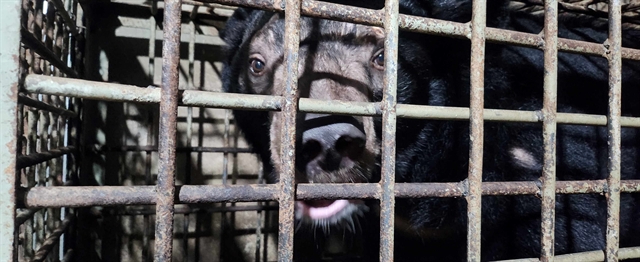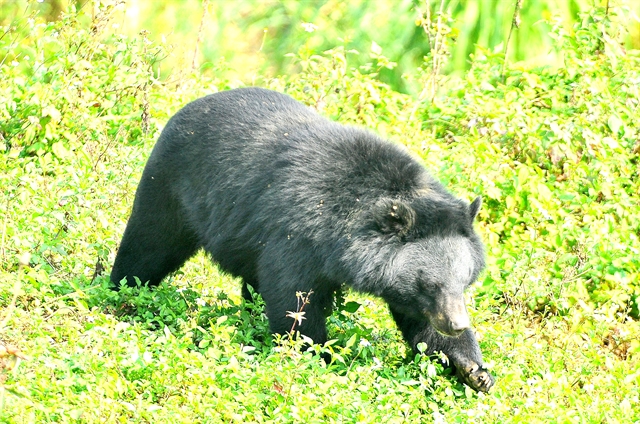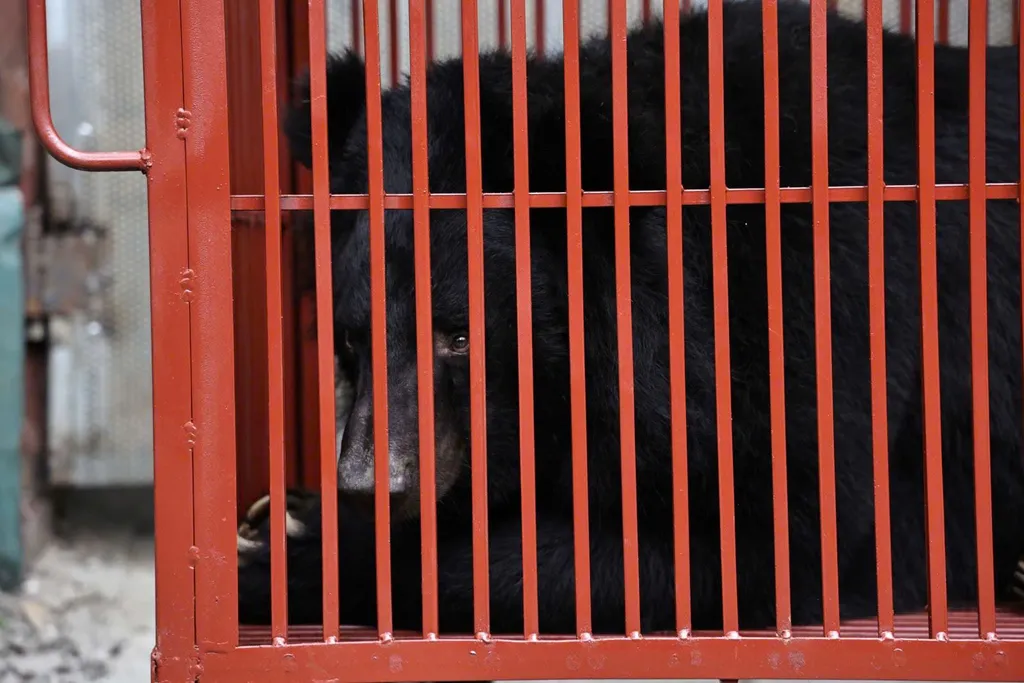 Environment
Environment

 |
| A bear plays in a semi-wild habitat at the bear conservation centre in the northern province of Ninh Bính. —VNA/VNS Photo Minh Đức |
By Nguyễn Hằng
HÀ NỘI — The journey to end bear farming for bile extraction in Việt Nam is a challenge, but the journey is nearing completion after nearly two decades of relentless efforts.
The number of bears kept in captivity in Việt Nam has decreased by an impressive 95 per cent, from approximately 4,000 individuals in 2005 to just 192 at 60 bear farms at the end of August.
Bùi Thị Hà, Deputy Director of the Education for Nature Việt Nam (ENV), said that 46 out of 63 provinces and cities nationwide no longer have bears kept for bile extraction.
Furthermore, a survey conducted by ENV in major urban areas indicates that the consumption of bear bile has dropped by 61 per cent from 2009 to 2014.
"This represents a significant milestone, showing that we are on the right path in our efforts to end bear farming in Việt Nam," said Hà.
The Forest Protection Department under the Ministry of Agriculture and Rural Development (MARD) as well as local forestry agencies across the country played a crucial role in phasing out bear farming through registration, microchipping and regular monitoring of captive bears, ensuring effective enforcement of laws protecting the animals.
Hoàng Công Hoài Nam, Head of the Forest Protection Division in the Central Highlands province of Lâm Đồng, said that previously, around 20 bears were kept by locals across various districts.
However, through persistent efforts, the forestry team successfully persuaded owners to transfer their bears to rescue centres.
“The achievement positioned Lâm Đồng as one of the first provinces to eliminate bear farming for bile extraction,” she said.
The province is home to Cát Tiên National Park, which offers excellent conditions for rescued bears.
Nông Trường Giang, Head of the Forest Protection Station in Lạng Sơn City in the mountainous northern province of Lạng Sơn, said some bear owners were reluctant to transfer their bears to rescue centres.
After extensive advocacy and collaboration with local authorities, by June 2021, the last owner in the province surrendered three bears to the Tam Đảo Rescue Centre, marking Lạng Sơn as the 40th locality to end bear captivity.
In a similar vein, the Forest Protection Division in the southern province of Bình Dương also successfully facilitated the transfer of 94 bears from various farms to rescue centres.
A challenging journey
In 2005, following the discovery of around 4,000 bears kept for bile extraction nationwide, MARD partnered with World Animal Protection (WAP) to launch a campaign aimed at gradually eliminating the practice.
From the outset, the agricultural ministry issued Decision 02/2005/QĐ-BNN concerning the management of captive bears. The decision mandated that all captive bears be microchipped for identification and management. Any unregistered bears would be confiscated.
The registration and microchipping process was completed by 2006.
Hà said: "The 20-year journey to end bear bile farming has been a long journey. If it had been an easy task, it likely would not have taken so long."
During the process, significant challenges emerged, particularly the demand for bear bile and bear-derived products among certain segments of the population.
“The demand has been a major driver of the illegal trade in bear products,” she added.
Despite the progress made, some owners continued to illegally extract bile for profit, refusing to relinquish their bears to the authorities.
Enforcement efforts faced numerous obstacles, including the widespread online advertising and sale of bear products by bear owners, complicating law enforcement actions.
Giang, Head of the Forest Protection Station in Lạng Sơn City, also said that authorities faced numerous difficulties in persuading local bear owners to surrender their animals, as many were motivated by profit and resistant to giving up their bears.
ENV data revealed that while significant strides have been made, there are still 192 bears in captivity across farms in 17 provinces and cities nationwide.
Hà Nội remains a hotspot
 |
| Photo shows one of three moon bears that Animals Asia successfully rescued from a household in Phụng Thượng Commune, Phúc Thọ District, in Hà Nội on April 9.— Photo courtesy of Animal Asia |
Hà Nội remains a hotspot for bear captivity, housing the highest number of captive bears in the country, accounting for approximately 49 per cent of all bears kept in Việt Nam.
As of the end of August, 94 bears are still being held in 16 private facilities in Hà Nội, with 94.7 per cent concentrated in Phúc Thọ District.
"This indicates that there is still much work to be done to eliminate bear farming in Việt Nam, allowing wild bear populations to recover," Hà told Việt Nam News at a press conference held on Tuesday in Hà Nội.
The situation was compounded by a lack of awareness among residents in Phúc Thọ, who have historically viewed bear farming as a legitimate trade.
Many bear owners in the area seek compensation for their investments before considering transferring their bears to authorities.
“However, such compensation is unreasonable, given that these bears were illegally captured in the past,” she said.
Lê Duy Phương, a consultant for WAP, told Việt Nam News that “Phúc Thọ has a long tradition of keeping wild animals, not just bears, serving as a distribution hub for neighbouring provinces.”
Despite a 50 per cent reduction in captive bear numbers over the past 20 years due to the efforts of authorities and NGOs, significant numbers remain, he said.
Hà emphasised the need for public awareness campaigns to reduce demand for bear products and stringent penalties to expedite the end of bear farming in Việt Nam.
"We hope that with community support and the determination of authorised agencies, we can soon reach our goal," she added.
Recently, ENV has observed positive changes in Hà Nội, particularly in law enforcement and public engagement.
However, Hà stressed that authorities must adopt more decisive measures to completely eliminate bear bile farming in the capital.
Still working hard
Phương also mentioned that the chip-based management system, supported by WAP, has significantly reduced the number of captive bears in Việt Nam.
After the microchipping process, the organisation regularly collaborates with authorities to inspect bear farms.
Its two main objectives are to monitor and prevent new bears from entering the farms, as microchipped bears are documented, and to apply pressure on owners to relinquish their bears.
“All these efforts aim to reduce the number of captive bears to zero as swiftly as possible,” he said.
Maya Pastakia, International Campaign Manager at WAP, said that for nearly 20 years, the organisation -- in collaboration with the Vietnamese Government, the general public and other NGOs -- has been working diligently to end the cruel practice of bear bile farming.
During this time, through collaborative efforts, they have reduced the number of bears used for bile from about 4,000 in 2005 to 192 bears per day.
“That’s a fantastic achievement,” she said.
It has been a long journey, but like many others who have been working hard on the issue, the organisation is very proud to see that the number of farmed bears has been reduced by 95 per cent, giving hope that bear bile farming would soon be completely eliminated in Việt Nam.
“Convincing bear owners to give up their bears has been difficult, but with determination and political will, all provinces in the country can achieve this goal,” said Pastakia.
Actions from the Vietnamese Government, organisations and individuals are key to stopping the exploitation of bears now and protecting them in the future.
“We want to see every bear in Việt Nam rescued and moved to a sanctuary to live the rest of their lives free from cruelty, pain and suffering,” she said.
"Bears do not belong to humans, they belong to the wild,” Phương said.— VNS




